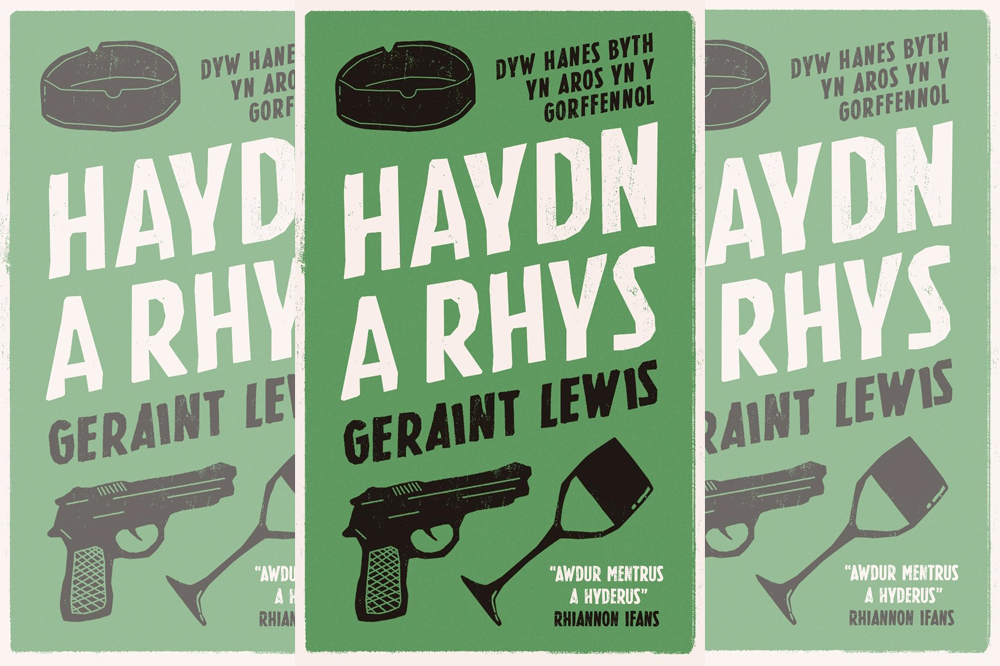Book review: Haydn a Rhys

Jon Gower
If causing the reader to mis-step was the intention of this very entertaining novel then it fully succeeds at the task: it is one almighty banana skin – one liberally dipped in lubricating oil and set on a skid pan at that. There is a palpable sense of Lewis having fun as he writes, which communicates easily to the reader.
It’s most certainly evident when he indulges in the occasional spot of paronomasia – being the grammatical term for word-punning – such as coining the word ‘merlota’ for the act of drinking ‘merlot.’
Indeed there’s an awful lot of drinking in this book with small rivulets of Prosecco, local beers and red wine running through the plot.
Just to add to the dipsomania there are three plot points which hinge on bottles of Calvados, as if Gwasg Carreg Gwalch is indulging in some product placement.
History
It all starts out a bit like tasting the ‘Last of the Summer Wine’ as we find out about the relationship between two old friends going back to the days of early childhood in Ceredigion and follow them through holidays in Brittany to their early love affairs.
As the strap line on the cover tells us ‘History never stays in the past.’ Central to Haydn and Rhys’s love lives is Ann, who eventually becomes Haydn’s wife, even though there are strong suggestions that she has had an affair with his best friend Rhys.
It’s a novel full of such hints and suggestions, nods in the wrong direction and some that are right and was written in part because Lewis noticed that there is a bit of a dearth of novels about men in their seventies.
He has filled that apparent gap in the market at a single stroke and done so with aplomb and imagination.
Even from the off, Haydn and Rhys’s personalities are very different and it is clear that their trajectories through life will mirror that.
The novel deftly changes chronology, cutting back and forth from Wales to London and switching decades.
In the English capital we see the duplicitous Rhys as a successful if criminal night club owner, running The Fun House not far from Victoria bus station, even though he avers it’s actually in Belgravia.
He indulges in money laundering and gets involved with the wrong crowd while Haydn’s life is much more sedate, turning on his marriage to Anne and the upbringing of their daughter Teleri.
Sleuthing
When we encounter them on holiday on Ynys Môn there’s much more to the vacation than meets the eye and it transpires that Haydn’s brought them north to do some amateur sleuthing.
Haydn is the older kind of manabee detective, but Poirot he is most certainly not. He believes that his son-in-law Scott is having an affair and wants to catch him in the act and unmask his lover into the bargain.
So Haydn and Rhys start their surveillance of a caravan on the site where they have booked themselves in to stay and prove themselves to be pretty inept.
The subject of their covert studies is Rachel in caravan number 120. When they try to break in when Rachel’s out running they do with comical ineptitude.
Smiley’s People they are most certainly are not. It is little wonder she catches Haydn red-handed. It would never happen to Maigret.
Loaded gun
What is certain is that there’s a gun in all of the novel’s dizzy mix and, as the great playwright Anton Chekhov suggested, if there’s a gun involved someone’s going to have to pull the trigger.
It certainly adds to the tension even as it ups the stakes in a work of fiction that darkens as it proceeds, especially so in a climactic ending that acts like a blow to the solar plexus.
Explosive
Another potentially explosive ingredient is a question mark over Haydn being Teleri’s father and as if that wasn’t inflammatory enough Geraint Lewis pours petrol over the paternity suit when it’s suggested that Rhys might be the dad.
All of sudden that pistol secreted in the shed turns into a lethal weapon.
This cunning, deftly plotted tale the plot is a swimming pool filled with red herrings and things are never quite what they seem.
Lewis relishes putting the reader on the wrong foot as if a little bit of havoc really makes a holiday.
This is popular Welsh language fiction at its best – accessible, funny and consistently entertaining even as it keeps the reader second guessing.
Not wanting to give the game away, I can totally guarantee you won’t see whatever it is coming.
Haydn a Rhys by Geraint Lewis is published by Gwasg Carreg Gwalch and is available from all good bookshops.
Support our Nation today
For the price of a cup of coffee a month you can help us create an independent, not-for-profit, national news service for the people of Wales, by the people of Wales.






great